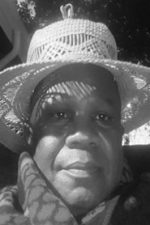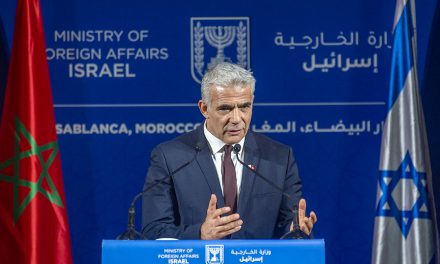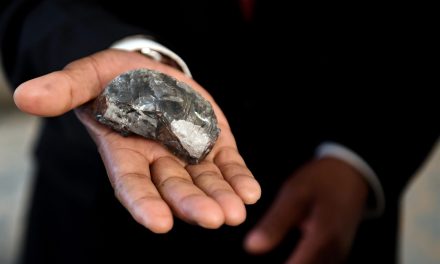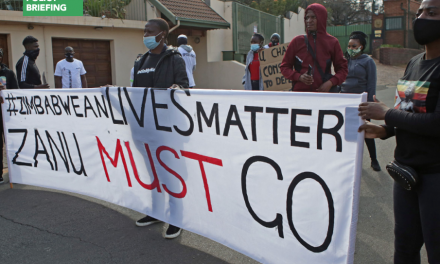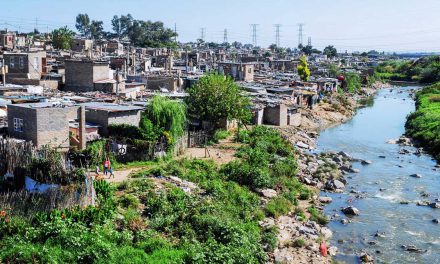The Basotho are homogenous people sharing a language, culture, and history. The kingdom covers 30,000 square kilometers, and has a population of about 2,175,699. Lesotho was a British colony for 98 years and gained independence on 4 October 1966. The totem of the country is Khotso (Peace), Pula (Rain) and Nala (Abundance).
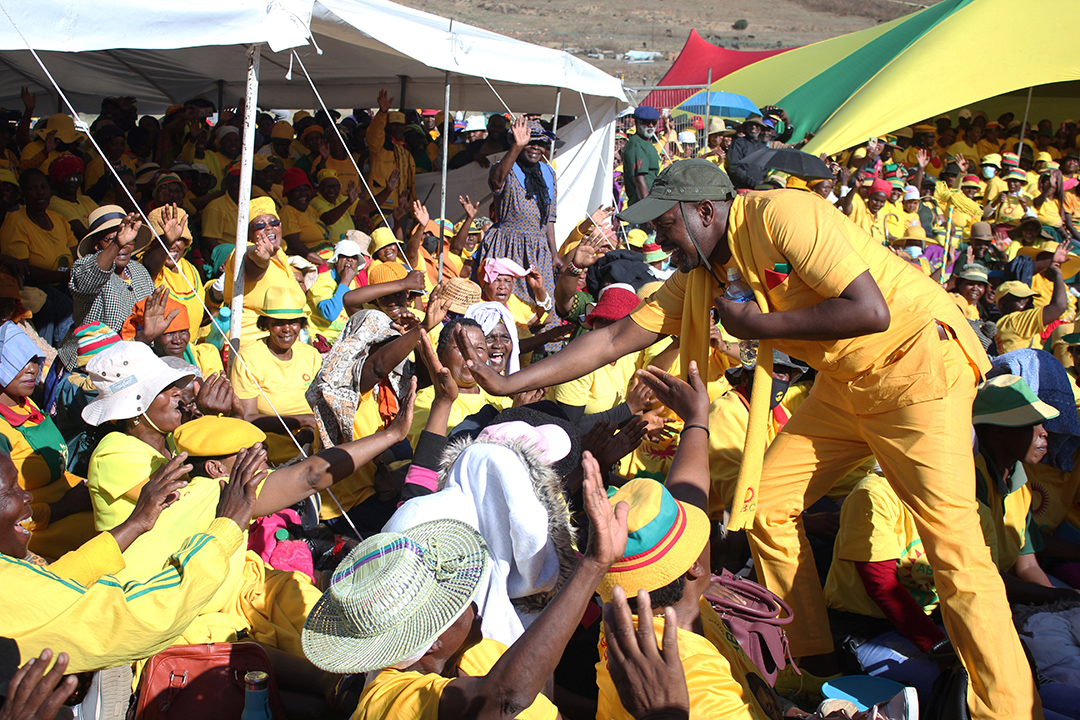
The All Basotho Convention (ABC) leader Nkaku Kabi greets supporters at the ABC last electoral campaign rally five days ahead of the vote for the general elections in Maseru on October 02, 2022. Photo: MOLISE MOLISE/AFP
Political instability is one of the most intractable social problems of developing countries, including Lesotho. Much of the literature traces the country’s political instability to the Westminster constitutional architecture: post-election challenges; civil-military relations and historical dynamics of state formation; Lesotho’s weak economy; a small middle class; deep income inequalities and citizens’ excessive reliance on the state for survival. The failure of Lesotho’s political elite to cooperate for the greater good is itself a manifestation of the historical legacy of elite fragmentation and mistrust.
In mitigating some sources of instability in the country, the SADC intervened through various mechanisms such as the deployment of former president Ketumile Masire as chairman of the OAU’s International Panel of Eminent Personalities, commissioned to investigate the Rwandan genocide, post the 2007 Lesotho elections. The SADC deployed the SADC Observer Mission to the Kingdom of Lesotho and appointed President Cyril Ramaphosa as the facilitator of the Lesotho National Dialogue. President Ramaphosa later appointed retired Deputy Chief Justice Dikgang Moseneke to support the kingdom on the comprehensive reform process that the country failed to complete on time.
The 2022 election will be held in line with the old Electoral Law of 2011, as the High Court recently nullified the state of emergency including the reforms undertaken during the period. The SADC further deployed its defence force, dubbed the SADC Preventive Mission, to support the reform process and serve as a deterrent to rogue members of the Lesotho Defence Force (LDF) from destabilising the country. So far, these efforts have reduced but not fully ended instability in the country. Lesotho has been on the SADC agenda for 16 years since 2007.
- Why does Lesotho hold elections?
Countries including Lesotho hold elections for various reasons. In Lesotho, it is a constitutional requirement as the Electoral Act No. 14 of 2011 spells out when the elections should be held and the processes to be followed.
- Factors contributing to the proliferation of political parties
Since the restoration of democratic multiparty politics in 1993, the country experienced a proliferation of political parties. The contributing factors included, among others: The political elites as well as the opposition have been motivated by the desire for access to state power as well as the benefits that come with public office; the election process itself motivates the proliferation as more political parties mushroom and in 2022 elections 65 parties are contesting; those who win are entitled to perks such as a monthly salary of M37,000; interest-free loans of M500,000; a chance to influence the awarding of lucrative government tenders and awarding themselves M5,000 to bury the dead in their constituencies; There are too many political parties, most having been formed for the single purpose of the pursuit of the interests of those who established them.
Registered political parties are entitled to funding from the Consolidated Fund for campaigning and payment of party agents. Despite legal requirements for accountability after the disbursement of these funds, some political parties fail to account thereafter. More often than not, political parties mushroomed because of politics of the stomach – many wanted wealth and food for their families, not necessarily national welfare. This became evident with the high levels of corruption among the politicians.
The 2022 elections are no exception, to the extent that Commissioner Tšoeu Petlane commented that looking at the rate at which political parties were registering, there was a possibility that Lesotho could have 100 parties by the time of the 2022 elections. Thirty-five of the parties were formed between 2021 and October 2022 and met the political party legal registration requirements as stipulated in Section 24 of the National Assembly Electoral Act of 2011. Of the 65 , only four were led by women, namely: United for Change (UFC) led by ’Malichaba Lekhoaba, HOPE led by Machabana Lemphane-Letsie, Reformed Congress of Lesotho (RCL) led by Keketso Rantšo; and Prayer Shawl and Light (PSL) led by Masechaba Ntšihlele.
History of elections in Lesotho
Since independence, the country has held nine elections (1965, 1970, 1993, 1998, 2002, 2007, 2012, 2015, and 2017) and the 10th is scheduled for 7 October 2022. The BNP won the first elections, as reflected in the Table A below:
Table A: Outcomes of 1965 elections
| Party Name | No of votes | No of seats |
| BNP | 108,106 | 31 |
| BCP | 103,050 | 25 |
| MFP | 42,837 | 4 |
| Independents | 5,697 | 0 |
The post-independence elections were held in 1970. Table B shows the outcomes before they were announced, in which the BCP appeared to be winning:
Table B: Undeclared outcomes of 1970 elections
| Party Name | No of votes | No of seats |
| BCP | 151,868 | 35 |
| BNP | 127, 410 | 23 |
| MFP | 42,837 | 1 |
Chief Leabua declared a state of emergency before the elections were finalised and the first coup d’état in the country took place. Since then, Lesotho has experienced four successful coups (1970, 1986, 1991, and 1994), five attempted coups (1974, 1991, 1996, 2009, and 2014), and one undeclared coup in 1998. Leabua was deposed in 1986 when the military comprising six members of the Military Council[1] took over.
In 1991 a second coup was staged that resulted in Major-Gen Phisoana Ramaema taking the reins and leading the country to the elections in 1993 in which 12 political parties participated. There were nine new political parties formed. The BCP won 65 seats overwhelmingly, and it was described as a de facto one-party government. The BCP government was troubled by mutinies of the army and the police but prevailed through SADC intervention (Botswana, South Africa, and Zimbabwe).
Another election was held in May 1998, in which the LCD led by former Prime Minister Pakalitha Mosisili garnered 79 of the 80 parliamentary seats. Consequently, the opposition parties protested that they had been cheated. This led to increasingly vociferous protests and the SADC intervention. Following the SADC advice, political stakeholders established an Interim Political Authority (IPA) comprising 12 political parties that participated in the 1998 elections. According to its founding Act No.4, the IPA was tasked with reforming the existing electoral process, reviewing all laws pertaining to elections, as well as the structure and the functions of the Independent Electoral Commission, then identifying an appropriate model for Lesotho.
In December 1999 an agreement was reached between all the stakeholders who committed themselves to ensuring that Lesotho held successful, legitimate, free, and fair elections. The National Assembly Election No.1 Amendment Act of 2001, which amended the National Election Act of 1992, gave authority to the IPA to establish the Mixed Member Proportion (MMP), which combined Proportional Representation (PR) and FPTP.
Subsequently, the new model was incorporated in Lesotho’s Constitution and was implemented during the 2002 elections, with the MMP broadening representation in parliament. After the 2007 elections, the opposition accepted the outcome of the elections but disputed the allocation of PR seat allocation. The SADC intervened by appointing Sir Ketumile Masire as the Eminent Person but the government told him that his mediation efforts had run their course and he subsequently resigned.
The MMP Model resulted in hung parliaments in Lesotho after the 2012, 2015, and 2017 snap elections. As a result, political parties formed alliances and created coalition governments. The first coalition government (2012-2015) led by former PM Thabane, comprised the triumvirate, All Basotho Convention (ABC), BNP, and LCD. The second coalition government (2015-2017) led by Mosisili, comprised seven political parties, namely: BCP, Democratic Congress (DC), LCD, MFP, National Independent Party (NIP) Lesotho People’s Party (LPC), and Popular Front for Democracy (PFD).
The third coalition government (2017-2020) led by former Prime Minister Thomas Thabane, comprised four political parties: ABC, BNP, Alliance of Democrats (AD), and Reformed Congress of Lesotho (RCL). The grand coalition government (2020 to 2022) comprised two political parties, ABC and DC led by Prime Minister Moeketsi Majoro and Deputy Prime Minister (DPM) Mathibeli Mokhothu. They were supported by other small parties such as BCP, BNP, RCL, NIP, PFD, LPC, and Movement for Economic Change (MEC).
The first three coalition governments did not finish their five-year tenure due to various factors. The first coalition experienced internal squabbles as it was personality-driven with a standoff between Thabane and Mothejoa Metsing, former Deputy Prime Minister. There was a lack of cohesion, discipline, unity, and effectiveness. The second coalition was collapsed by two factors: the misuse of the vote of no confidence and the reign of terror created by a Team of 20 comprising LDF members led by the late Major Bulane Sechele and Col Tefo Hashatsi. In 2015 and 2017, both Lt-General Maaparankoe Mahao and Lt- Gen Khoantle Motsomotso met their death at the hands of both Sechele and Hashatsi.
The collapse of the third coalition was self-inflicted. Four key factors contributed to its collapse: First, the power struggle between Thabane and his Deputy Nqosa Mahao, which resulted in the State House and Likatana factions that weakened the party and government; second, the meddling of the former First lady ‘Maesaia Thabane in the country’s politics and allegations of murder of Thabane’s first wife, Lipolelo Thabane; third, pressure from within ABC for Thabane to resign. He gave in and resigned on 19 May 2022 and finally, the mass resignation of the ABC members joined the opposition. The grand coalition survived because of the resoluteness of the DC that refused to entertain the infighting within the ABC. It also did not support endless votes of no confidence in Majoro. As a result, the grand coalition lasted till the end of its term without holding snap elections.
On 14 July 2022, King Letsie dissolved the Tenth Parliament under section 83 (2) of the Constitution of Lesotho. Subsequently, on 19 July 2022, he announced 7 October 2022 an election date through Legal Notice No. 63 of 2022. The political parties started campaigning. While listening to the campaigns and manifestos of various political parties, Basotho voters must heed the words of Octavia Butler (2019, 181), that:
“Choose your leaders with wisdom and forethought. To be led by a coward is to be controlled by all that the coward fears. To be led by a fool is to be led by the opportunist who controls the fool. To be led by a thief is to offer up your most precious treasures to be stolen. To be led by a liar is to ask to be told lies. To be led by a tyrant is to sell yourself and those you love into slavery”.[2]
Since independence, the following Prime Ministers (PMs) have ruled the country: Leabua (1966-1986, 21 years), Military rule (1986-1993, 23 years) led by Lekhanya and Ramaema respectively, Mokhehle (1993-1997, four years), Pakalitha Mosisili (1997-2012, 15 years), Thomas (2012-2015, three years), Mosisili (2015-2017, two years), Thabane (2017-2020, three years), Moeketsi Majoro (2020-2022, two years). The key parties likely to lead the elections and possibly establish a coalition after the 2022 elections are Basotho Action Party (BAP) DC, Revolution for Prosperity (RFP), (a new party established in April 2022), and ABC (though troubled by infighting).
[1] Included Major General Metsing Lekhnaya (Chairperson), Col. Phisoana Ramaema, Sekhobe Letsie, Thaabe Letsie,
[2] Butler, O. Parable of the talents. The Grand Central Publishing. New York.
Mokete Pherudi is the former head of the Committee of Intelligence & Security Services of Africa (CISSA) in Addis Ababa, Ethiopia. He has participated in a number of election observation missions in southern Africa and beyond. He has also served as a technocrat in the SADC regional mediation and facilitation processes in countries such as Lesotho, Madagascar and Zimbabwe. Pherudi recently published a book titled Governance and Democracy in Lesotho: Challenges faced by SADC intervention, 2007-2015.

